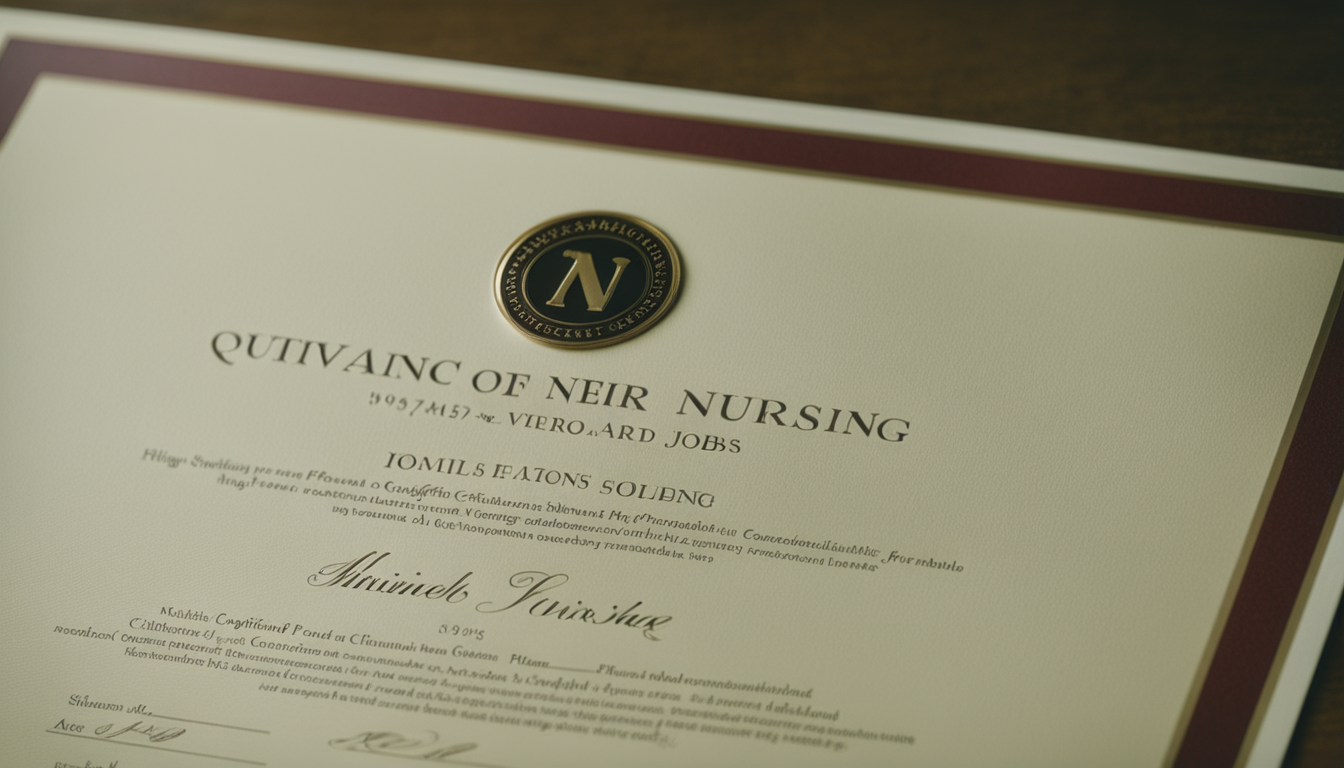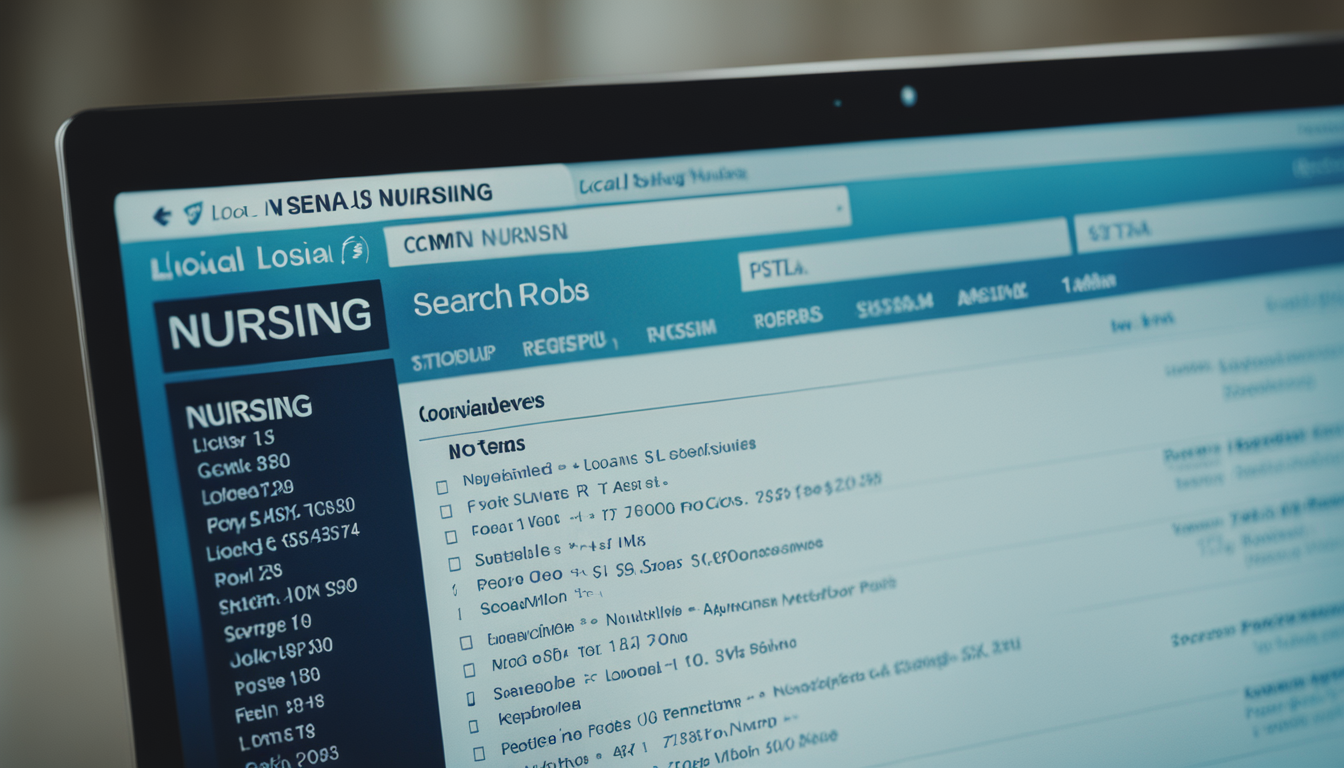Introduction: Exploring Top-Paying Nursing Opportunities

In the vast and dynamic field of nursing, the range of income can swing considerably. However, it’s not impossible to discover high-paying jobs, especially for Registered Nurses (RNs), who play such vital roles within the healthcare system. RNs are the backbone of patient care, armed with various specialties, qualifications, and job roles that extend far beyond just a hospital setting. Whether it’s in private practice, academia, public health, or even sought-after travel nursing roles, opportunities for lucrative positions abound. To secure these high-paying jobs, particular skills and qualifications are crucial. Understanding your local nursing job market can also play a pivotal role in your job search. Remember, the key to unlocking these roles might be closer than you think, as jobs for registered nurses near me are available across different cities known for their high compensation packages. So buckle up as we embark on an adventure, navigating through the endless avenues of high-paying nursing opportunities.
What are Registered Nurses?

Registered nurses are healthcare professionals who play a vital role in improving patients’ health outcomes and quality of life. These healthcare warriors bear multi-layered responsibilities that range from assessing patient health conditions to operating medical equipment and assisting doctors with medical procedures. They also act as a critical link in the chain of healthcare communication, collaborating with other healthcare professionals, patients, and their families to ensure a holistic approach to care.
The qualifications of a registered nurse typically involves a bachelor’s or an associate degree in nursing. Beyond educational prerequisites, some states also require registered nurses to complete an approved nursing program to earn a nursing license. The role demands a blend of hard and soft skills including clinical competence, excellent interpersonal and communication skills, critical thinking, compassion, and resilience. It’s important to note that registered nurses work in high-stress environments and often handle emergency situations. For example, in a life-threatening situation such as a cardiac arrest or severe trauma, a registered nurse could be called upon to provide immediate life-saving interventions. This career path is not only rewarding financially, but it also offers a sense of purpose, as recognized by the profound impact registered nurses make in mitigating health crises and enhancing community wellbeing.
Importance of Registered Nurses in Healthcare

Registered Nurses (RNs) play a critical and indispensable role in the healthcare ecosystem. They are a crucial link between patients and physicians, often serving as the first line of medical care. Whether it’s for routine checkups, emergencies, or chronic illness management, their multifaceted roles cover a variety of tasks. From administering medications, monitoring patient recovery, and providing updates to doctors to direct involvement in patient education and emotional support, RNs are often the compassionate face of healthcare, forming a bond with patients and their families.
Their valuation in the healthcare sector underlines their expertise beyond just clinical skills. It encompasses excellent communication, critical thinking, and management skills, all of which are essential for patient safety and satisfaction. For instance, Christine Smith, an experienced RN from Johns Hopkins Hospital, once successfully advocated for her critical care patient’s treatment shift, leading to considerable improvement in patient health. Stories like these are a testament to how RNs impact patient outcomes positively, justifying their indispensable role in the medical world. Their holistic contribution is transformative, not just to the patients but also to the healthcare system as they bridge the gap between health services and the community.
The Various Specialties of Registered Nurses

Registered Nurses (RNs) can venture into a variety of subfields, each possessing its unique set of rewards and challenges. In acute care nursing, for instance, RNs work in bustling environments such as emergency rooms and intensive care units. These adrenaline-charged roles demand resilience and adaptability, as nurses contend with diverse and often critical situations. For a less hectic alternative, RNs can opt for geriatric nursing where the primary focus is caring for aging patients. Geriatric nurses play a crucial role in managing the health of the elderly, which often includes managing chronic illnesses and providing comfort during the twilight years.
Pediatric nursing is another specialization to consider, where RNs work with children, from infants to adolescents. The work can be rewarding, as nurses have the opportunity to impact younger lives positively. They also act as a critical liaison between the child, family and healthcare team, managing everything from routine check-ups to addressing childhood diseases. On the other hand, psychiatric nursing caters to patients’ mental health needs. Here, nurses work in a supportive and therapeutic capacity, helping patients to manage mental illnesses, such as depression, schizophrenia, or bipolar disorder.
Finally, surgical nurses play vital roles in the operating room. This specialty allows RNs to be a part of intricate procedures, supporting the surgical team and providing postoperative care. Public health nursing, on the other hand, looks beyond individual care to the health of the broader community. They work in government and nonprofit agencies, clinics, schools, and even homes, pushing health initiatives, performing research, and advocating for health and wellness at a societal level. They even get to influence policy and bring about legislative changes for better healthcare. So, with these diverse specialties, registered nurses have a plethora of exciting, high-paying career paths to explore.
Key Skills and Qualifications for High-Paying Nursing Jobs

Securing high-paying nursing jobs necessitates a certain level of expertise and qualifications. For instance, essential skills such as clinical competence, strong communication, empathy, detail-orientation, and stamina often spearhead the list of requirements. Clinical competence is the backbone of nursing, underscoring the ability to confidently perform various healthcare procedures. A high level of expertise in areas like critical care, emergency nursing, or pediatrics may increase potential earnings.
Moreover, attentive communication skills serve to facilitate better interactions with patients, their families, and the healthcare team. Registered Nurses utilizing empathy can enhance patient care by understanding and respecting patient feelings or concerns. Attention to detail ensures safe and effective patient care, reducing the possibility of errors, while physical and emotional stamina, supports their ability to cope with the demands of lengthy shifts, continuos care and high-stress situations.
Lastly, certifications and qualifications also play a considerable role in securing high-paying nursing jobs. For instance, becoming a Certified Registered Nurse Anesthetist (CRNA) or achieving a Doctor of Nursing Practice degree can certainly place a Registered Nurse at a higher pay scale. Accomplishing this type of specialized training signals a solid commitment to the nursing field that employers appreciate and often reward with higher compensation.
Understanding the Nursing Job Market Near Me

Getting an accurate pulse on your local nursing job market can be key to your success. Local job markets for Registered Nurses can greatly vary based on the region’s health care needs. These needs can depend on factors such as the region’s aging population and the demands of local healthcare facilities.
There are various ways to dissect and understand this local job market data. A popular method is to analyze Bureau of Labor Statistics data, which showcases the demand for nurses across the U.S, breaking it down region by region. In addition to this, local job listings can give you a real-time snapshot of the health care needs in your area.
Local nursing associations can also serve as great resources. They often have in-depth knowledge about the regional nursing job market, and can provide insight into job opportunities, areas of demand, and potential challenges.
Lastly, leveraging contacts within the nursing and healthcare community for market insights can prove beneficial. Your peers, managers, and mentors can provide first-hand knowledge about the current job landscape. They may also be able to provide you with direct opportunities or recommend you to others.
Best Cities for High-Paying Nursing Jobs

If you’ve considered a career in nursing, you might be curious about which cities offer the best income potential. Cities such as San Francisco, CA, and Boston, MA, are known for their higher paying nursing opportunities. These cities have robust healthcare systems, demanding top-rated professionals, and thus, provide healthy compensation packages.
California and Massachusetts are not the only states with higher pay rates. In fact, Huntsville, AL, and New York, NY, also have substantial opportunities. These cities encourage healthcare growth, and the demand for Registered Nurses (RNs) exceeds the supply, leading to increased salaries.
Moreover, experienced RNs seeking better pay should consider relocating to cities like Bridgeport, CT, or Seattle, WA, where nursing positions are critically in demand. Here, experienced nurses are often compensated significantly more compared to other parts of the country.
However, keep in mind that higher salaries often correspond with the cost of living. Cities like San Francisco and New York come with higher living expenses. Thoroughly researching each city, taking into account housing, transportation, and overall cost of living, will help you make an informed decision on where you’d like to seek employment.
High-Paying Jobs for Registered Nurses in Hospitals

Registered nurses (RNs) seeking high-paying jobs should consider opportunities within hospital settings. Not only do hospitals often offer competitive wages, but the breadth of specialties available can lead to lucrative roles. With possibilities spanning from Cardiovascular to Neonatal RN positions, the potential for earnings heightens, particularly for those demonstrating expertise in their chosen specialty.
Benefits packages facilitated by hospitals often contribute to overall compensation. This can include health insurance, paid leave, and retirement plans, further enhancing total earnings. Ascension Health and Kaiser Permanente, for example, are renowned for offering RNs high remuneration.
Besides the financial benefits, working in a hospital environment often fosters professional growth. Considering the complex scenarios an RN might encounter, the potential for honing skills and knowledge is limitless. Acquiring such experiences often paves the way for advancements and prospective salary increases.
Alternatively, experienced RNs could pursue roles like Nurse Anesthetists or Nurse Practitioners within hospital settings. Jobs such as these often offer salaries exceeding 100,000 dollars annually. An example of this is Massachusetts General Hospital, acclaimed for its attractive salaries for such positions.
Ultimately, hospital RN positions promise a balance of attractive salaries, plentiful opportunities, and possibilities for professional development. Opting for a career in this path could prove advantageous for those seeking to maximize their income and enrich their nursing careers.
High-Paying Jobs for Registered Nurses in Private Practices

Private practices offer attractive remuneration opportunities for Registered Nurses (RNs). These environments are often less stressful than hospital settings, offering intriguing work-life balance advantages. Many private practices house numerous specializations under one roof. This setup presents a unique opportunity for RNs to expand their skill set in multiple medical disciplines.
By engaging with specialists in different fields, RNs in private practices can improve their versatility, making them more valuable and leading to increased earnings. For instance, an RN working in a private practice with a dermatologist, a cardiologist, and an endocrinologist broadens their understanding of different patient conditions.
Moreover, private practices typically treat a regular clientele. This arrangement allows RNs to develop in-depth knowledge of recurring patient cases, creating a niche experience and providing a basis for potential higher income. For example, an RN who regularly interacts with diabetic patients could consider becoming a Certified Diabetes Educator.
Private practice owners also value RNs’ roles for their business continuity, often providing attractive compensation packages. Given the office-based nature of their work, RNs may negotiate salaries that aren’t entirely tied to insurance reimbursements, like in hospitals.
Finally, private practices often foster closer patient-nurse relationships, which can result in a more fulfilling nursing experience. This emotional reward, coupled with the potential high pay, makes working in private practices highly desirable for RNs.
High-Paying Jobs for Registered Nurses in Academia

The field of academia offers a plethora of high-paying roles for registered nurses. From teaching prospective nurses the tricks of the trade to enriching nursing curriculums with their first-hand experiences, registered nurses are in high demand. Positions include professors, lecturers, and deans in nursing schools. These roles not only offer the opportunity to share knowledge but also command respectable salaries.
Registered nurses can further leverage their expertise towards writing or editing academic textbooks in nursing. As authors or editors, they have the chance to shape the future of nursing education. It’s an excellent opportunity for nurses seeking to combine their passion for nursing with their love for writing or profound knowledge in nursing sciences.
Another high-paying role is as a healthcare consultant with a focus on education. Here, registered nurses can advise and guide higher education institutions and healthcare facilities about the best practices in nursing education and patient care, providing a key link between both sectors.
Lastly, opportunities abound in research-based roles. Registered nurses can offer invaluable contributions to clinical trials and health research projects, turning the latest scientific findings into practical healthcare applications. Overall, a move into academia can prove to be both financially rewarding and personally satisfying for registered nurses.
High-Paying Jobs for Registered Nurses in Public Health

Public health presents numerous avenues for Registered Nurses (RNs) to secure handsome salaries. Statistically, many urban communities and remote areas alike struggle with public health crises, enhancing the demand for expert healthcare professionals. RNs in this sector can serve as health educators, policy advocates, or researchers, negotiating substantial paychecks as they combat health disparities.
Aside from influencing communities’ overall health, RNs in public health engage in preventive care, often commanding a high wage due to the critical role this plays in controlling healthcare expenses. Examples of their tasks might include running immunization campaigns or teaching individuals about disease prevention, tangible actions that can significantly impact society’s healthcare cost burden.
Moreover, RNs can find lucrative positions in public health administration. Possessing a comprehensive view of patient care allows them to contribute productively to policy-making or supervisory roles. For example, an RN working as a Public Health Administrator might oversee a health department or public clinic, making crucial decisions that impact community health and earning a significant salary in return.
Ultimately, RNs interested in high-paying roles should contemplate the field of public health. Their vital skills can be put to use in operational, educational and administrative roles, all while securing attractive salaries that reflect their invaluable contribution to public health. The marriage of nursing expertise with public health needs presents a win-win scenario for RNs looking for more lucrative opportunities.
High-Paying Travel Nursing Jobs Near Me

Discover the allure of travel nursing as a lucrative alternative. These positions often command high salaries due to temporary contracts and shifting locations. In addition to substantial income, travel nursing can offer opportunities for exploration and personal growth. Places known for rewarding their travel nurses well include California, Washington, and Florida. Weekend and on-call work could also amplify your paycheck. However, bear in mind that the specifics of salary depend on the needs of each healthcare facility and your own experience. Sourcing for this can make use of travel nursing agencies, which could help in securing contracts that match your expertise. Lastly, remember to factor in the cost of living in your destination into your consideration.
Navigating Online Job Search for Nursing Jobs Near Me

Looking for the right job can be daunting without the right strategies. To identify high-paying nursing jobs near you, it’s important to take advantage of online resources. By using job search platforms specifically tailored for healthcare professionals, you can filter job postings based on your specialization and desired pay grade.
Moreover, consider networking online. LinkedIn and other professional networks can put you in contact with decision-makers at healthcare facilities. Networking can open opportunities not yet listed on job boards.
Lastly, ensure your online presence reflects your professional image. Keep your digital resume up-to-date and be proactive in engaging with posts related to your field. Establishing an online professional identity can increase your visibility to potential employers.
Benefits and Drawbacks of High-Paying Nursing Jobs

High-paying nursing jobs, like positions in specialized fields or executive roles in healthcare facilities, come with their own set of pros and cons. The benefits include financial stability and professional growth opportunities that come with advanced roles. However, drawbacks such as increased workload, responsibility, and stress also come with the territory. For instance, a nurse manager in a critical care unit may earn significantly more, but also has to handle team management, administrative duties, and high-stakes decision-making.
Overall, the trade-off in high-earning nursing roles is between higher income and the increased demands associated with these positions. Nurses may also face long hours and the mental strain of intense work environments. For example, a nurse anesthetist, one of the highest paying nursing specialties, deals not only with complex medical procedures but also the heavy responsibility of patient life and safety. Yet, despite these challenges, many nurses find the rewards and fulfillment of their expanded roles worth the added pressure.
Salary Expectations for High-Paying Nursing Jobs

When discussing salary expectations for high-paying nursing jobs, it’s critical to provide a detailed perspective. The income range can vary significantly based on aspects such as specialization, location, and level of experience. For instance, an experienced Registered Nurse in a specialty like anesthetics or dialysis in a high-demand market might expect a six-figure income. Conversely, entry-level positions or jobs in less competitive areas may offer lower yet still respectable wages.
Additional factors contribute to salary calculations, from overtime and on-call availability to advanced qualifications or leadership roles. For example, Nurse Practitioners or Nurse Anesthetists may command higher salaries due to their advanced credentials and critical roles. Therefore, aspiring high-income nurses should focus not only on gaining experience but also on expanding their skill set and seeking advanced certifications.
How to Prepare for High-Paying Nursing Job Interviews

Preparing for high-paying nursing job interviews involves a strategic approach. Conduct in-depth research about the potential employer’s history, values, and clientele. Familiarize yourself with common nursing interview questions and craft thoughtful, articulate responses. Practicing these answers with a mentor or peer improves confidence. It’s crucial to prioritize showcasing skills and qualifications directly related to the job description. Bringing relevant certifications, patient testimonials, or recommendation letters can provide tangible evidence of your qualifications. And always remember, making a good first impression counts. Wear professional attire and arrive on-time to show seriousness and respect for the job opportunity.
Tips for Negotiating a High-Paying Registered Nurse Salary

To secure a lucrative registered nurse salary, concrete negotiation strategies need to be acquired. Begin by reviewing similar job offers in different healthcare institutions in your locality; getting paid beneath the market rate is avoidable if concrete data supports your discussions. More than experience or qualifications, proving you should command a significant income based on market trends is valuable.
Next, don’t forget to consider benefits as part of your overall package. Aside from base salary, there may be opportunities for overtime, weekend, or on-call pay that significantly boosts your whole compensation. Understanding and articulating these perks can lead to more effective negotiation discussions.
Transitioning From An Average Paying Job to High-Paying Job

Making the shift from an average paying nursing job to a high-paying one requires strategic career development. Developing advanced skills through further studies or specialized trainings, for instance, can make you more appealing to employers and open doors to higher salary brackets. You can also explore nursing positions in industries or settings that tend to offer better compensation, such as private practices or certain specialties.
Proactively networking can pave the way too. Join professional nursing organizations, attend industry conferences, and leverage online platforms for networking. Use these avenues not just to find potential job opportunities, but also to learn about the job market and gather insights on how to elevate your career further.
Future Trends of High-Paying Registered Nursing Jobs

The future of high-paying nursing jobs is expected to see several key trends. As healthcare needs continue to evolve, innovative tools and care approaches will play a crucial role in the nursing field. For instance, the rise of telehealth could increase demand for tech-savvy nurses. Further, a move towards value-based care could see nurses take on leadership roles to manage patient health outcomes efficiently. Additionally, specialties such as nurse anesthesia and geriatric nursing are predicted to see a rise in salary due to an aging population. Understanding these trends could help in shaping a lucrative nursing career.
Conclusion: Embarking on Your High-Paying Nursing Career Search

You are now well-equipped with the knowledge and resources to claim a high-paying nursing job. Do not shy away from exploring the range and possibilities that lie within your grasp. With this information, you hold the steering wheel to navigate your future in the highly rewarding field of nursing. Remember, your skills, dedication, and passion form the foundational key to unlock these prime opportunities. Good luck on this exciting journey, and may your search lead you to a fulfilling and prosperous career.
Sources:
- www.bls.gov
- www.glassdoor.com
- www.nurse.org
- www.medicalnewstoday.com
- www.ama-assn.org

